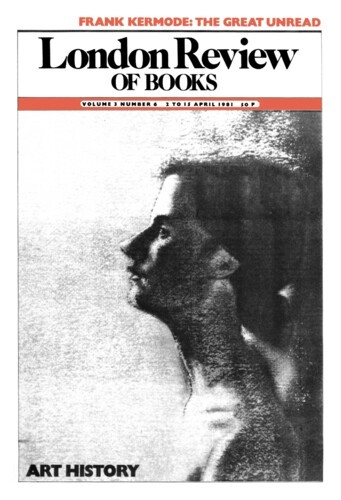I
Almost time, and the sun at last
round to her open classroom door.
A dusty glowing bar tipped
across desk-tops, paper, heads
and basking her face and hair.
She lets it dazzle a moment,
arms folded, one shoe eased
half-off, and the room dissolves.
No drawing lesson.
No children. No maps pinned
low on the walls. No names.
Just brilliant crude light
swimming with flecks of chalk –
the silence lasting and lasting
and broken by Please, Miss.
Is it nearly the bell? She steps
forward, Quick. Let me see,
stooping desk after desk
in the high-pitched babble
of whispers. I’m hopeless at art.
Me too. Me too. Demented stick-men
whose mouths have slipped to a shriek.
Houses buckled together. Bare roads
under smoke flattened in both directions.
II
It could be any summer evening. After work
I am caught in the slow traffic from Banbury –
out past the cross to Adderbury, Deddington,
Aston, and left towards home. These are the signs:
Upper Heyford on white arrows, the blackberry hedges
suddenly stopped in wire. Then for an instant
grass to a runway flashing its mirage of water,
and up by the hangars a lumbering grey-green plane.
Hedges hide it again, but five minutes on
the desolate blank roar whips overhead,
leaving my tyres inaudibly spirting the gravel
and breath so utterly drowned it might not exist.
III
In this new silence I push
the garden door and leave it wide.
Two starlings bounce on their aerial,
hushed a moment then wheezing
and chatting again. I am quick
down the dark corridor – our coats
brushing one arm with hollow sleeves,
through to the warm kitchen.
Here is a wasp on the window,
furious, rushing the glass
with a slow magnetised slide
from side to side. Out you go.
I flick the catch and scoop
to the real air – lupins tall
in the sun, and the may
with its dense unruffled shadow.
The shelter is almost hidden beyond –
an angle of smooth cement, and grass
crushed where the steps disappear.
We shall finish tonight
crouching shy and deformed
in our painting clothes,
whitewashing walls between bunks
and makeshift empty shelves.
IV
Beyond the shelter a low hedge
and the valley to Rousham – dovecote
and battlements breaking their cloud
of thick sheltering beech. Think of it
gone – the serpentine Watery Walk,
the Temple of Echo, Venus Vale,
the pensive lead Apollo melted
a mile overhead. One cloudless
October day we followed his gaze
down to the Cherwell’s edge and there
with each jagged stripe distinct, a pike
idled through musty sun. Inch by inch
its slow glimmer edged into weed
then our shadows struck, and it thrashed
to nothing. Think of the Cherwell gone –
the riverbed smoky earth
and the keen ornamental dog
looking on, with a yew-berry
lodged in its open mouth,
nowhere, and not to be found.
V
As I stare, his car on the gravel:
the engine revved and cut, a pause,
and his door slammed. Then leaning close
in the kitchen rehearsing his day –
traffic to Bicester, the morning lessons,
and Later, he says, the whole long afternoon
with Tennyson pointing towards the land
in which it seemed always afternoon.
I fan my face and smile: Ah why
should life alt labour be? Remember?
We only toil who are the first of things,
and glance outside. By the window now
I am podding beans for supper and see him
wait by the shelter steps, one hand swinging
his yellow bucket and brushes. A flabby pop,
and my thumb slides through moist soft fur.
VI
I tell him Wait.
Let me finish these first,
slewing empty pods on the table
then out, crouched in the shelter
stroking the thick whitewash on.
We hardly speak – bending
and turning and bending
embarrassed, the cold smell
raw in my throat.
Which of us knocks the light?
He straightens and sighs,
watching the bulb sway
slowly across and back,
swelling our ogre shadows
and fluently reeling them in.
What is it? I say,
but before he can answer I know.
Shall we sleep here tonight?
In the shelter, to try it?
What do you think?
VII
They have dragged the single
spare mattress out, one edge
dark with dew from the lawn.
We’re children, she says,
playing this game, but he smiles
and she tumbles the blankets down.
Shall I turn out the light?
Only the thin moon and stars
to show them now – they are caught
unsteady a moment, faltering
side by side on the wobbly mattress
and springs’ orchestra. Mind!
The whitewash! Then they are gone –
the door squeaking heavily shut
as he whispers Wait. Are you there?
Of course. She says it smiling. Of course.
Send Letters To:
The Editor
London Review of Books,
28 Little Russell Street
London, WC1A 2HN
letters@lrb.co.uk
Please include name, address, and a telephone number.

